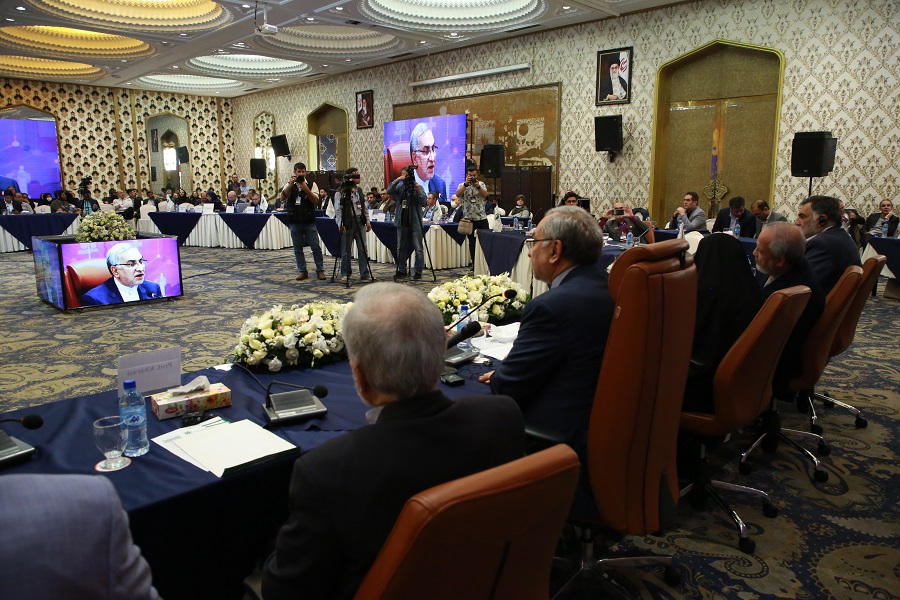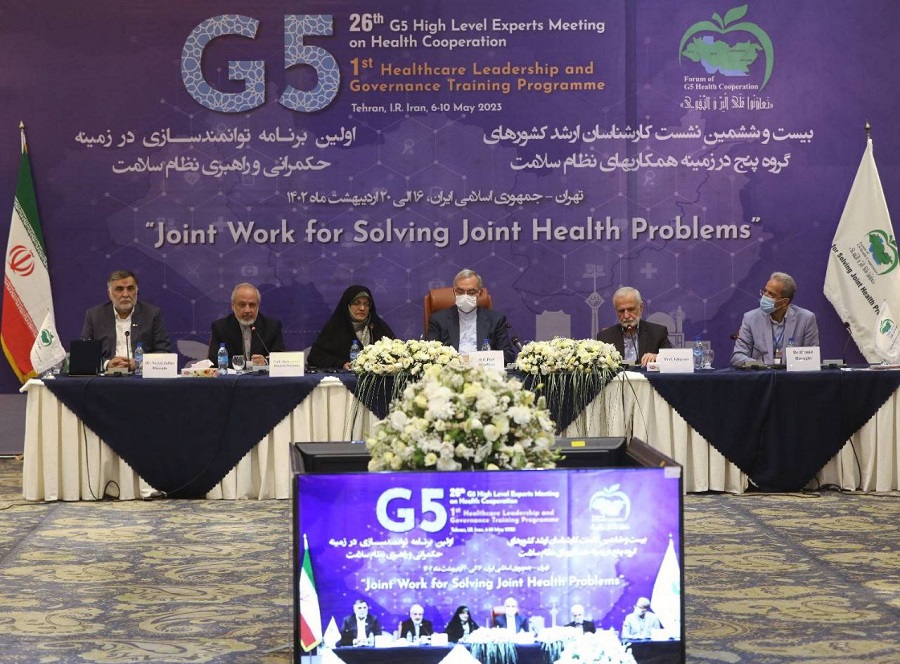
25 May 2023 – Islamic Republic of Iran hosted a 5-day subregional meeting entitled "First health care leadership and governance training programme" with attendance of G5 Member States, including Afghanistan, Iraq, Islamic Republic of Iran and Pakistan, and WHO, together with Tajikistan as the observer member. The meeting, held 6–10 May focused on building governance, leadership, and managerial capacity of high-level health care managers of the G5 countries to address common health challenges at national and regional level.
The meeting was inaugurated in the presence of ministers of health of the respective countries, senior health care managers from G5 Member States, technical officers from the WHO Regional Office for the Eastern Mediterranean and WHO country offices in G5 countries, the UN Resident Coordinator in Islamic Republic of Iran and Iranian senior officials and members of parliament. The opening ceremony featured a video message from Dr Ahmed Al-Mandhari, the WHO Regional Director for the Eastern Mediterranean.
“I strongly believe that the G5 will add value to the health programmes and operations that countries of the Region are implementing to achieve the targets of the Sustainable Development Goals, WHO’s Thirteenth General Programme of Work, and our regional Vision 2023,” said Dr Al-Mandhari in his message. He emphasized the importance of regional and subregional collaboration and partnerships to the Region’s stability and prosperity, stressing that and it is only through collective action that we can regain achievements in health, promote development and improve people’s health and well-being.
In another part of the opening ceremony, Dr Ensieh Khazali, Islamic Republic of Iran’s Vice-President for Women and Family Affairs, called for the formation of a special working group for women's health among the G5 countries and emphasized the need to recognize women as the cornerstone of health in families. “Women are the educators of the new generations, and if they learn about the importance of health, the lifestyle and health of societies will be guaranteed in the future,” she contended.
The meeting discussed the challenges faced by health systems and identified priorities in G5 countries. The event comprised 3 all-day technical sessions structured around the 3 main areas based on the Tehran Communique on joint collaboration for health, approved in September 2022:
health systems strengthening based on primary health care;
prevention and control of communicable diseases and cross-border collaboration on mass gatherings; and
implementation of the International Health Regulations.
At the beginning of each day, the countries presented a report on their current situation, and then WHO senior technical officers and presenters from Islamic Republic of Iran would provide insights on the priorities and necessary actions in each area. At the end of each session, priorities were identified and appropriate activities to address the priorities were prepared in the form of a work plan, which was endorsed by all participants. Participants agreed on a 4-year action plan (2024–2027).
At the closing ceremony Dr Syed Jaffar Hussain, WHO Representative to the Islamic Republic of Iran, along with Dr Robin Nandy, UNICEF Representative to Islamic Republic of Iran on behalf of all UN agencies in the country presented plaques of appreciation to Dr Einollahi, the Minister of Health and Medical Education, and Dr Nicknam, Chair of G5 Secretariat, in recognition of their efforts to put health at the centre of development and political policies in the Region and empower health officials of the G5 countries.
“Health and disease know no borders, and their benefits and harms reach all countries and people. The G5 platform strengthens regional partnership, offering a unique south-to-south cooperation platform,” stated Dr Hussain. He reiterated WHO’s support for such initiatives and urged G5 countries to act on their commitments.
Head of the Strategic Council on Foreign Relations in Islamic Republic of Iran Dr Kamal Kharrazi said that the G5 was a basis for humanitarian and international cooperation based on WHO standards and emphasized, “This forum is an example of effective international collaboration that has many positive effects because health is not a controversial issue, and we can also help each other in economic, cultural and political areas in addition to solving health problems.”
In his closing remarks, Dr Einollahi thanked WHO for its collaboration and technical support in organizing the meeting and also preparing the 4-year action plan and requested WHO to share the reports and achievements of the G5 meeting with other WHO Member States in the Region. He requested that representatives of the G5 countries submit a report of the meeting to presidents, parliament members and senior officials in order to garner support for the G5 initiative.
Group 5 was established as an initiative of the Islamic Republic of Iran based on historical, geographical and cultural links and common health problems by signing a memorandum of understanding to enhance and strengthen subregional cooperation on health among Afghanistan, Iraq, Islamic Republic of Iran and Pakistan, and WHO in June 2005 at the 52nd session of the WHO Regional Committee for the Eastern Mediterranean. Later on, Tajikistan joined as an observer. The G5 mechanism with the slogan of “joint work for solving joint health problems” presents a unique platform for cooperation among similar countries to improve the health situation in the Region.





